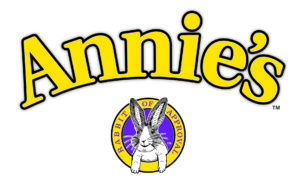Annie’s Homegrown (General Mills)

| Rating |     |
| Farm/Brand Headquarters | Berkeley, CA |
| Products | Cheese, packaged goods (pasta), canned meals, yogurt |
| Website | www.annies.com |
| Market Area | Nationwide |
| Total Score | 1305 |
Annie’s, Inc. is a natural and organic food brand offering great-tasting products in large packaged food categories. Annie’s products are made without artificial flavors, synthetic colors and preservatives common in many conventional packaged foods. Additionally, Annie’s sources ingredients so as to avoid synthetic growth hormones and genetically modified food ingredients. Today, Annie’s offers over 300 products and is present in over 70,000 retail locations in the United States and Canada. Founded in 1989, Annie’s is committed to operating in a socially responsible and environmentally sustainable manner. Annie’s is a proud member of the natural and organic portfolio of General Mills. For more information, visit www.annies.com.
| Criteria | Points | Comment |
|---|---|---|
| TOTAL (possible score is 1600 plus extra credit) | 1305 | 4-Cow Rating | Excellent     |
|
Farmstead dairies earn the most points. Corporations that have a history of skirting the organic rules receive the fewest. Ownership structure | 70 | Corporation with a good track record of transparency |
|
Farms that produce 100% of their milk receive the most points. Milk from "open market" or known confinement dairies receive the fewest. Milk Supply | 90 | Sourced from trusted dairy cooperative |
|
100% organic farms receive the most points. Split operations with conventional dairy on the same property receive the fewest. Organic Production | 90 | All of Annie's yogurt products are certified organic; they also sell natural foods. Suppliers do not have split dairies. |
|
Farms that completed the survey in detail received the most points.
Disclosure of Information for Verification | 100 | Full disclosure |
|
Points determined by integrity of the brand’s organic certifier. Organic Certification | 75 | Quality Assurance International (QAI) |
|
Animal Welfare Approved and Biodynamic certifications receive the most bonus points. Producers are not penalized for not having additional certifications beyond organic. Other Labels/Standards | 0 | None |
|
100% grass-fed with independent verification of standards Grass-fed | 50 | Exceeds USDA minimum percent intake requirements |
|
No points are given for this but the information may be useful to certain consumers looking to avoid soy. Soy Free Ration? | No - soy is likely including in ration | |
|
Sliding scale based on policies, enforcement, acreage/cow, days/year on pasture, and permissible exemption. Pasture | 70 | Most supplier farms do some more-than-average grazing |
|
One time/day receives the most points. Two times per day is standard. Times Milked | 90 | Most daries milk twice a day (standard organic practice) |
|
Lower cull rate scores better, with under 10% receiving the most points. Cull/death Rate | 75 | Moderate cull/death rate. Will vary widely between farms. |
|
Farms with closed herds receive the most points. Farms that sell organic calves and buy conventional replacements receive the fewest. Replacements | 100 | Closed herds |
|
Standard practice is removing calves shortly after birth, with extra points given for unique ways of managing calves
Calves | 75 | Removed shortly after birth (standard practice) |
|
Farms that prohibit antibiotics receive the most points. Farms that allow young stock to receive antibiotics (under one year), receive the fewest.
Antibiotic Use | 100 | No antibiotic use |
|
No hormones is the standard, however some farms do use oxytocin for therapeutic purposes. Hormone Usage | 100 | No hormone use |
|
Farmstead dairies (owner lives on-site) receive the most points. Fewer points are given as oversight declines. Farm Support | 80 | Depends on trusted third-party for supervision; All larger farms are visited more frequently; most farms visited annually |
|
All ingredients sourced from inside the organization or on the farm receives the highest points. Ingredients from confinement factory farms and/or imported ingredients receive the fewest. Procurement of Ingredients | 90 | Outside ingredients from trusted sources |
|
Various levels of extra credit given for 1) providing full organic systems plan, 2) providing details on all farms (multi-farm brands, details on largest five required), and 3) sourcing feed on-farm or domestically. Extra Credit | 50 | With respect to the concern of fraudulent grain imports, this brand gets all of their feed from “open source” certified organic feed but were transparent enough to share that detail with us. |

